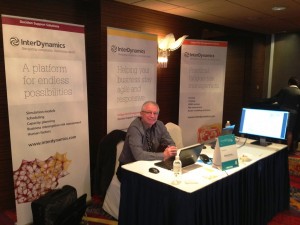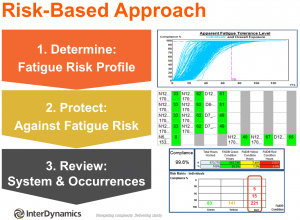Issue #23 – December 2013
Welcome to Focus on Fatigue,
SEASONS GREETINGS!
Whether things are slowing down for you, or you are working through the next couple of weeks, all of us here at InterDynamics would like to wish you a safe and blessed holiday season. As we enter into a period of heat waves over Christmas here in Australia, things are definitely heating up internationally with regards to FRMS as well.
As you will see in this edition, 2013 has been a big one for us as far as speaking engagements and conferences go. Much time has also been spent listening to regulator and industry requirements, with work going on behind the scenes in the development of exciting new and refined products for 2014 – watch this space..
If there is something new or improved that you would like to see as far as technology is concerned, to assist with the risk management of fatigue – let us know! We are always looking for opportunities to bring good science and operationally practical tools and sound methodologies to market.
Being that time of year when many of us take to the roads to see family or ‘get away from it all’ for a while, we thought we would feature the issue of commuting and the risk associated with fatigue on the roads. This edition’s Feature Article discusses the relationship between FAID and commuting time from a modelling, and risk management perspective, with some startling new statistics about the higher than previously thought percentage of car crashes caused by fatigue in the ‘In the News’ section. It’s not all bad news however, we have 12 tips to help you make it through the day when you haven’t been able to get the amount of sleep required (too many Christmas parties anyone?), and some positive recent fatigue related research to help beat the shift-work blues. We hope you enjoy the selection of articles in this edition of ‘Focus on Fatigue’, and wish you safe travels as 2013 fades into the rear view mirror, and we drive full steam ahead into the dawn of 2014.
Thank you for your ongoing support over the past year, and we look forward to sharing a successful 2014 together.
Work Safely.
Peter Mushenko
Senior Fatigue Risk Consultant
![]()
InterDynamics Pty Ltd
320 Adelaide Street Brisbane Qld 4000
Tel +61 2 8404 0400 Ext 23
www.interdynamics.com
Views expressed in articles and links provided are those of the individual authors, and do not necessarily represent the views of InterDynamics (except where directly attributed).
Feature Article
FAID and Commuting
We often get questions asking whether, and how FAID takes into account the time taken by workers in their commute to and from work.
Here we share what InterDynamics’ scientific advisor Dr Adam Fletcher (from whose thesis FAID resulted) has indicated on the subject, as well as some practical reminders of how to get the most out of FAID in terms of effective Risk Management.
InterDynamics News
How to win the hearts and minds of the workforce
As many of us have realised, the key to successful FRMS implemention is good change management, with change in organisational culture sometimes required at all levels. This is no mean feat, and certainly does not happen without careful thought and attention to how this can best be achieved.
Conferences and presentations
Modern Railways 2013 Conference, Singapore, May 29-31
The 3rd Annual Modern Railways Conference held in Singapore from 29th to 31st May was attended by InterDynamics’ management team of Peter Page and Len Pearson.
This conference, organised by Marcus Evans, attracted over 160 delegates from rail operations throughout Asia, Europe, Middle East and Africa.
Len presented a paper titled ” Empowering Successful Bids for PPP Provision and Maintenance of Rolling Stock Through the Use of Simulation Software” featuring the following key points:
- Using dynamic simulation to model system performance, operational requirements and likely failures
- Enabling an understanding of how complex systems behave in ways that simple extrapolation of deterministic outcomes cannot
- Assisting with strategies to better evaluate alternative capital, operating costs and inherent risks
The presentation focused on the use of MSID (Materiel Sustainability Tool by InterDynamics) and included two successful case studies featuring Downer EDI Rail in Sydney and Hitachi Europe for the UK.
The presentation was well received, with good levels of interest for rail focused planning tools and FRMS Solutions from InterDynamics.

Swinburne Aviation Conference, Victoria Australia, July 24-26
Swinburne University celebrated 21 years of Aviation this year, and hosted a three-day conference that brought together more than 150 aviation industry leaders, professionals, academics and researchers to embrace the many facets of contemporary aviation at the Hawthorn campus, Victoria.
Topics covered at this years conference included:
- latest regulatory and air traffic management developments
- airline and airport management issues
- human factors issues such as Fatigue Risk Management
- design and certification of new aircraft and their introduction into service
- engine developments, and alternative fuels
The Human Factors stream included a full day on Fatigue Risk Management Systems, with InterDynamics’ Senior Fatigue Risk Consultant Tu Mushenko invited to speak on ‘Successfully implementing a bio-mathematical model within an FRMS‘. Drawing on her engineering and project management background, Tu entertainingly used a case study on James Bond to engage the audience and draw out the broad range of things that contribute to fatigue, before drilling down to where bio-mathematical models (BMMs) fit within the three risk management or project management steps:
- Determine: Fatigue Risk Profile (Context)
- Protect: Against Fatigue Risk (Design & Implement)
- Review: System & Occurrences (Lessons Learned)
The value of, and practical ways in which a BMM such as FAID can assist with each of these stages was highlighted, with tips on how to look to different functionality of FAID dependent on which stage is being focused on.

Tu reminded attendees that adequate management of fatigue-related risks associated with working hours is more than compliance to working hour rules. Circadian influencers and biological limits to recovery are also important, and can be taken into consideration by the strategic use of a bio-mathematical model.
Contact us if you are interested in finding out more about this interesting and important topic.
2013 FRMS Forum, France, October 7-9
This year’s aviation industry FRMS Forum was held in early October at the Hyatt hotel at Charles de Gaulle Airport, Paris, France. The event included diverse speakers and organisations from around the world, sharing their experience and lessons learned in implementing Fatigue Risk Management Systems. InterDynamics, as a founding member of the Forum, was represented by Len Pearson, Tu and Peter Mushenko.
Pipeline Performance Group: Fatigue Risk Management Seminar and Workshop, Texas USA, February 5-6, 2014
In response to observations made at the API Pipeline Conference, one of our Alliance Partners in the USA, Pipeline Performance Group will be hosting a Fatigue Risk Management Seminar and Workshop to assist the industry in fatigue management and workload analysis.
Draft Agenda Highlights:
- What is a FRMS and Why Does PHMSA Promote Its Use? Charles Alday
- Fatigue 101 (same training presented to PHMSA inspectors). James Miller
- An Introduction to Human Factors. Michele Terranova
- Scientific and Risk-Based Approaches to Fatigue Risk Management. Len Pearson
- How to Address the Fatigue-related PHMSA inspection Questions. James Miller
- FAID Fatigue Modeling Software as Used in Pipeline Control Rooms. Len Pearson
- Scientific Approaches to Workload Measurement in Control Rooms and Industry Benchmarks. Michele Terranova
- Panel Discussions on Human Factors and Fatigue
- The Dirty Dozen Causes of Errors and Accidents. Charles Alday
Scheduled Speakers:
- Dr. James Miller consulted with PHMSA on the fatigue portion of the CRM rule
- Dr. Michele Terranova works with Pipeline Performance Group and has conducted over 40 workload studies to meet PHMSA regulations
- Len Pearson is the General Manager of InterDynamics, the providers of FAID fatigue modeling software
- Charles Alday works with Pipeline Performance Group and has worked with over 50 oil and gas companies on CRM related projects in 2011-2013, with more scheduled for 2014
This will be a terrific opportunity to learn more about Fatigue Risk Management within the Pipeline industry and meet others from the industry. Registrations have already been received from around 30 people from 11 different companies.
In the News
Fatigue on the road
Wake Up and Drive: Fatigue Causes 20 Percent of Crashes
A new study from the Virginia Tech Transportation reveals that 20 percent of car crashes are caused by fatigue, with young drivers particularly vulnerable to driving while fatigued. Previous estimates attributed fatigue to only 2 or 3 percent of crashes.
Case studies
Doctors and extreme fatigue: ‘I just couldn’t make myself think’
Rules limiting the hours that first-year residents, called interns, can work have not necessarily improved education or care, according to recent studies.
Research shows shift working nurses are more likely to be obese
Research shows job stress and shift work is contributing to obesity among nurses in America. While there is no known study linking obesity to shift work in Australia, nurses can take proactive steps to keep the extra kilos at bay and ensure they stay healthy for peak performance not only at work but in their every day lives.
Tips and Tricks
Get A Good Night of Quality Sleep With These 10 Shortcuts for Falling Asleep in Record Time
If you think the secret to a restful sleep after a hard day’s work is to have a drink and a smoke, take medication or watch television, you are about to be shocked and pleasantly surprised at the alternatives.
12 Ways To Boost Your Energy When You Haven’t Slept
You barely slept at all last night, but playing hooky (from your job, from your family, from your life) today just isn’t an option. Here’s how to fake it until you make it — to bedtime.
Good news for the holidays
Night shifts not linked to mental decline
In a large study, middle-aged women working night shifts didn’t suffer any long-term impairment in their thinking skills.
Going camping this Christmas can help reset your body clock
Night owls struggling to go to sleep at night and wake up for work the next morning might do best packing up and spending a week under the stars, according to a new report published in the journal Current Biology. Led by Kenneth Wright of the University of Colorado Boulder, the study showed that a week of exposure to a natural dawn, complete darkness at night and dusks lit only by the glow of a campfire has the capacity to revert a person’s sleeping schedule to a more natural one.
Researchers identify new drug target for treating jet lag and shift work disorders
University of Notre Dame researchers, as part of a collaborative effort, have identified a protein that potentially could be a target for drugs that that would help people recover faster from jet lag and better adjust their circadian rhythms during rotational shift work.

